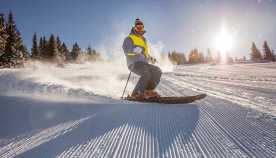AARP Eye Center
Utah Braces for Extreme Heat
The National Weather Service issued an Excessive Heat Warning for parts of Utah starting at 9AM on Wednesday, July 10 through midnight on Saturday, July 13. This includes most areas in the state west of I-15; the Wasatch Front, the West Desert, and the Salt Lake, Utah, and Cache Valleys.
Dangerously hot conditions can be expected with forecasted high temperatures of 100 to 105 Wednesday and 102 to 107 degrees Thursday through Saturday. As temperatures rise, people need to be more careful than ever to stay cool and avoid overheating and illness, particularly as they get older, medical experts say.
Stay inside on the hottest days. Seek out air-conditioning and don't go outside between the hours of 10AM and 6PM to spare your body the stress of the extreme heat. If you don't have air-conditioning, you can find a Salt Lake County Cooling Zone near you or contact 211 for assistance and referrals to cooling centers.
Drink plenty of fluids. Get in the habit of sipping regularly. As people age, their ability to sense thirst wanes. The CDC's guide for protecting older adults in the heat notes that people shouldn't wait until they feel thirsty to start drinking fluids. The National Academy of Medicine suggests men drink 15.5 cups of fluid per day and women drink about 11.5 cups daily.
Take a dip. That could mean going for a swim or a float in a pool or a lake, but it can also mean taking a cool shower or running through a backyard sprinkler (with the grandkids or not).
Take extra precautions when outside. Wear lightweight and loose fitting clothing. Older people have an increased risk of skin cancer, so wear sunscreen with broad spectrum protection, a broad-brimmed hat and sunglasses. Do not leave young children and pets in unattended vehicles. Car interiors will reach lethal temperatures in a matter of minutes.
Take action when you see symptoms of heat exhaustion and heat stroke. Anyone overcome by heat should be moved to a cool and shaded location. If you start to feel sluggish, light-headed, nauseated or dizzy after being outside, listen to your body. Heat stroke is an emergency! Call 911.
Other Helpful Resources:
















)


















.jpg?crop=true&anchor=13,195&q=80&color=ffffffff&u=lywnjt&w=2008&h=1154)





























